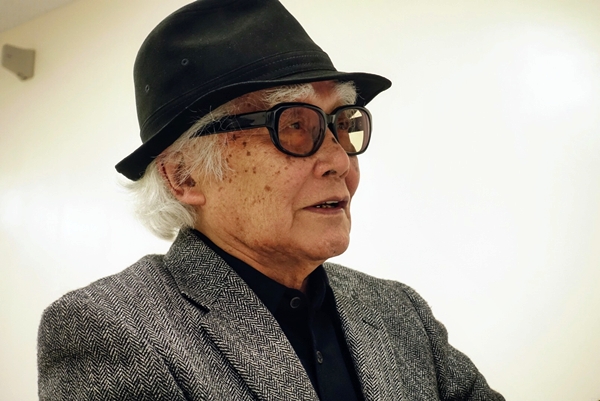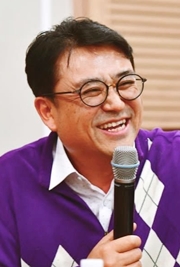[평화예술칼럼 Peace Art Column] (97) 김동현
제주도는 평화의 섬입니다. 항쟁과 학살의 역사를 가지고 있기에 평화를 염원하는 마음은 더욱 간절할 수 밖에 없습니다. 제주4.3이 그렇듯이 비극적 전쟁을 겪은 오키나와, 2.28 이래 40년간 독재체제를 겪어온 타이완도, 우산혁명으로 알려진 홍콩도 예술을 통해 평화를 갈구하는 ‘평화예술’이 역사와 함께 현실 속에 자리 잡고 있습니다. 이들 네 지역 예술가들이 연대해 평화예술운동을 벌이고 있습니다. 이들의 평화예술운동에 대한 창작과 비평, 이론과 실천의 공진화(共進化)도 매우 중요합니다. 독립언론 [제주의소리]가 네 나라 예술가들의 활동을 ‘평화예술칼럼(Peace Art Column)’을 통해 매주 소개합니다. 필자 국적에 따른 언어가 제각각 달라 영어 일어 중국어 번역 원고도 함께 게재합니다. [편집자 글]
냉전과 탈냉전의 시대를 거치면서 한국, 일본, 중국 등 동아시아 국가들은 자신들만의 시간 속에만 갇혀있지 않았다. 어찌보면 동아시아는 세계사로서의 동시적 시간을 공유해왔다고 할 수 있다. 오키나와와 제주는 국가폭력의 연속과 식민주의적 억압의 지속을 상징하는 지리적 공간이자 사유의 최전선이었다.
동아시아의 냉전과 신냉전의 시간을 들여다보기 위해서는 동아시아에서 미국이 패권국가로 등장하는 과정과 한국과 일본, 대만 등 동아시아 각국이 내셔널리즘의 정체성을 확립해 갔던 시간들을 동시에 사유해야 한다. 이 과정에서 동아시아 국가들은 스스로의 국가적 정체성 확립을 위해 내부의 차이와 균열을 포섭해갔다. 그것은 이른바 내부식민지로서 지역을 만들어간 시간들이라고 할 수 있다.
오키나와, 제주, 타이완 등 동아시아의 지역이 겪어야 했던 시간들은 국가라는 이름으로 가해진 폭력의 경험이기도 하였다. 그 과정에서 지역은 냉전의 대결과 국가 이데올로기를 자신의 신체에 스스로 새겨나갔다. 동아시아 평화공존을 위한 지적 네트워크의 필요성이 여러 차례 제기되어왔던 것은 그 자체로 그러한 실천이 얼마나 난망한 일인지를 잘 보여준다.
한국과 일본, 대만은 냉전과 포스트 냉전이라는 동아시아의 동시적 시간을 관통해왔다. 이 과정에서 미국이라는 신제국주의의 등장은 정치사상사 뿐만 아니라 사회, 문화 등 다양한 국면에서 강력한 영향력을 행사해왔다. 한국전쟁과 베트남전쟁이라는 명백한 물리적 폭력의 양상은 이후 글로벌 자본주의라는 세계성의 이식으로 이어져왔다. 이는 동아시아 국가의 경제적 성장의 배경이 되기도 하였지만 이러한 성장은 로컬이 지닌 다양성을 획일화하는 ‘은폐된 폭력’의 이식과정이기도 하였다.
동아시아의 개발과 근대화 프로젝트의 수행은 미국이라는 신제국주의의 이익과 길항하는 동시에 그 자체로 수많은 균열을 내포하는 복잡한 과정이기도 하였다. 그것은 폭력의 내면화와 인정욕망이 교차하는 사상사의 현장이기도 하였다. 오키나와 복귀 이후 벌어진 오키나와 부흥의 문제를 비롯하여 제주 4.3항쟁 이후 제주 지역에서 벌어졌던 개발계획들은 국가라는 균질성을 로컬에 이식하기 위한 전략이자 세계성이라는 이름으로 로컬의 목소리들을 억압해간 과정이기도 하였다. 한국과 일본, 중국, 대만을 둘러싼 국제 정치의 복잡성을 파악하기 위해서는 내부의 이질적인 존재들을 억압해갔던 폭력의 연속성과 직면해야만 한다.
한국과 일본, 중국 등 동아시아 각국의 대결 국면에 대한 국제적 위기가 높아지고 있다. 러시아의 우크라이나 침공으로 인한 전쟁의 위협이 동아시아의 긴장을 조성할 수 있다는 우려가 커지고 있다. 이러한 현실적 상황에서 동아시아 평화공동체 구축을 위한 지적 네트워크의 실천적 대안을 모색하고 정책적 대안을 도출하는 일은 평화공존의 공동체를 만들기 위한 출구가 될 수 있을 것이다.
하지만 눈을 각국의 현실 정치로 돌리면 상황은 녹록치 않았다. 윤석열 정부의 외교정책은 참사 수준이고 일본 기시다 정권 역시 마찬가지다. 이런 상황에서 일찌감치 오키나와 자립사상을 천명해왔던 '아라카와 아키라'의 논의에 귀 기울일 필요가 있다.

아라카와 아키라는 일본의 단카이 세대에 깊은 영향을 미친 작가이자 사상가이다. 그는 1950년대 미군정부의 폭력에 무방비로 노출되어 버린 오키나와의 문제를 누구보다 예민하게 감각하며 전쟁과 전후의 모순을 적극적으로 고발해야 한다고 말했다. 그는 문학의 정치와 정치의 문학의 가능성을 동시에 타진하면서 일본 정부를 ‘국가악’이라고 규정하면서 ‘지역의 자기결정권’의 필요성을 제기해왔다.
그의 대표적인 글인 ‘비국민의 사상과 논리-오키나와의 사상과 자립에 대해(非國民の思想と論理-沖繩における思想の自立について)’은 국가라는 환상이 오키나와전투의 희생의 배경이 되었음을 말하고 있다. ‘국민’이라는 이름으로 호명하는 순간, 수많은 폭력이 당연시되는 폭력의 악순환에 대한 그의 사상은 ‘반국가’라는 고통스런 투쟁의 연속이 결국 지역의 자기결정권의 근저임을 말하고 있다.
오해하지 말자. ‘반국가’가 국가에 대한 무조건적인 저항을 의미하는 것은 아니다. 국가보안법이 여전히 위력을 발휘하고 있는 남한 사회에서 ‘반국가’는 체체전복을 꾀하는 불순한 사상쯤으로 치부되기 쉽다. 하지만 아라카와 아키라의 ‘반국가’는 ‘국가’라는 이름을 내세워 행해지는 숱한 폭력을 거부하는 적극적 평화이다. 그의 이러한 사상을 읽다보면 프란츠 파농의 논의가 깊게 각인되어 있음을 느낄 수 있다.
일찍이 프란츠 파농은 <대지의 저주받은 사람들>에서 제국주의와 식민주의에 대한 저항의 필요성을 제기하며 폭력의 문제를 성찰한 바 있다. 그의 폭력론이 1960년대 흑인 민권 운동에 영향을 준 것도 사실이지만 사실 파농이 말하는 폭력은 물리적 폭력 그 자체가 아니라 ‘단단한 오늘’을 허물고 새로운 미래를 만들기 위한 창조로서의 폭력이다. 물리적 폭력의 행사가 불가능해진, 그리고 그러한 폭력이 대중적 지지를 받을 수도 없는 지금, 우리는 파농의 폭력론에서 무엇을 배워야 할 것인가.
그것은 동아시아라는 시간에 각인된 ‘냉전적 대결’, 식민주의의 폭력을 근본에서부터 다시 사유해야 함을 의미한다. 오늘을 무너뜨려야 새로운 평화의 연대가 창조된다는 명백한 사실에 대한 인식, 그리고 국가라는 이름으로 행해지는 폭력을 거부하는 지역의 사상적 독립. 아라카와 아키라를 다시 읽으며 동아시아 평화 연대의 새로운 가능성을 생각한다.

# 김동현
문학평론가. 제주에서 태어났다. 제주대학교 국문과와 한신대 문예창작대학원, 국민대 대학원에서 공부했다. 지은 책으로는 《제주, 우리 안의 식민지》, 《제주, 화산도를 말하다》(공저), 《재일조선인 자기서사의 문화지리》(공저) 등이 있다. 한때 지역신문 기자로 일하기도 했다. 지금은 제주, 오키나와를 중심에 두고 지역 연구를 계속하고 있다. 제주MBC, 제주 CBS 등 지역 방송 프로그램에서 시사평론가로, 경희대학교 글로벌 류큐·오키나와연구소 연구원으로, 제주민예총 이사장으로 활동하고 있다.
東アジアを再考する―沖縄の作家・新川明
キム·ドンヒョン 文学評論家/済州民芸総理事長
冷戦と脱冷戦の時代を経て、韓国、日本、中国など東アジア諸国は自分たちだけの時間に閉じ込もっていたのではなかった。東アジアは世界史としての同時的時間を共有してきたといえる。沖縄と済州は、国家暴力の連続と植民主義的抑圧の持続を象徴する地理的空間であり、思惟の最前線だった。 東アジアの冷戦と新冷戦の時間をうかがうためには、東アジアで米国が覇権国家として登場する過程と、韓国と日本、台湾など東アジア各国が国家的アイデンティティを確立していった時間を同時に思惟しなければならない。この過程で東アジア諸国は自らの国家的アイデンティティ確立のために内部の差異と亀裂を抱え込んだ。それは地域がいわゆる内国植民地に作られていった時間といえる。
沖縄、済州、台湾など東アジアの地域が経験しなければならなかった時間とは、国家という名のもとに加えられた暴力の経験でもあった。その過程で地域は冷戦の対決と国家イデオロギーを自ら刻み込んだ。東アジア平和共存のための知的ネットワークの必要性が何度も提起されてきたこと自体が、その困難さをよく物語っている。
韓国と日本、台湾は冷戦とポスト冷戦という東アジアの共時的時間を貫いてきた。この過程で登場した米国という新帝国主義は、政治思想史だけでなく社会、文化など多様な局面で強力な影響力を行使してきた。朝鮮戦争やベトナム戦争は、物理的な暴力というわかりやすい側面を持ちながら、その後、グローバル資本主義の移植を導いた。これは東アジア国家の経済成長の背景にもなったが、このような成長は地域が持つ多様性を画一化する「隠蔽された暴力」の移植過程でもあった。東アジアの開発と近代化プロジェクトの遂行は、米国という新帝国主義の利益と同時に拮抗しつつ、それ自体が数多くの亀裂を含む複雑な過程だ。それは暴力の内面化と認知の欲望が交差する思想史の現場でもあった。 沖縄復帰後に起こった沖縄復興の問題もそうだが、済州4·3抗争以後、済州地域で行われた開発計画は、国家としての均質性をローカルに移植する戦略であり、グローバルという名でローカルの声を抑圧していった過程でもあった。韓国と日本、中国、台湾をめぐる国際政治の複雑性を把握するためには、内部の異質な存在を抑圧してきた暴力の連続性と直面しなければならない。
韓国と日本、中国など東アジア各国の対決局面に対する国際的危機や、ロシアのウクライナ侵攻による戦争の脅威が東アジアの緊張を醸成しかねないという懸念が高まっている。このような現実において、東アジア平和共同体構築のための知的ネットワークの実践的代案を模索し、政策の代案を導き出すことは、平和共存の共同体を作るための出口となり得る。
しかし目を各国の現実政治に向けると、状況は容易ではない。尹錫烈(ユン·ソクヨル)政府の外交政策は惨事の水準であり、日本の岸田政権も同様だ。このような状況で、早くから沖縄自立思想を明らかにしてきた新川明の議論に耳を傾ける必要がある。新川は日本の団塊世代に深い影響を及ぼした作家であり思想家だ。彼は1950年代、米軍政府の暴力に対して無防備に露出してしまった沖縄の問題を誰よりも敏感にならねばならないと述べ、戦争と戦後の矛盾を積極的に告発する。彼は文学の政治と政治文学の可能性を同時に打診しつつ、日本政府を「国家悪」と規定して「地域の自己決定権」の必要性を提起してきた。彼の代表作『「非国民」の思想と論理-沖縄における思想の自立について』は、国家という幻想が沖縄戦の犠牲の背景となったことを語っている。「国民」と呼ばれる瞬間に正当化される数多くの暴力の悪循環に対する彼の思想は、「反国家」という苦しい闘争が、結局は地域の自己決定権の基礎であることを語る。誤解のないようにしよう。「反国家」が国家に対する無条件の抵抗を意味するわけではない。国家保安法が依然として威力を発揮している韓国社会では「反国家」は体制転覆を図るうろんな思想だと思われやすい。しかし、新川の「反国家」は「国家」の名を掲げて行われる多くの暴力を拒否する積極的平和だ。彼の思想を読んでみると、フランツ・ファノンの議論が深く刻印されていることが分かる。
かつてファノンは『地に呪われたる者』で帝国主義と植民主義に対する抵抗の必要性を提起し、暴力の問題を省察した。彼の暴力論が1960年代の黒人公民権運動に影響したのは事実だが、実はファノンが言う暴力は物理的暴力そのものではなく、「固い今日」を崩して新しい未来を作るための創造としての暴力だ。物理的暴力の行使が不可能になり、そのような暴力が大衆的支持を受けることができない今、私たちはファノンの暴力論から何を学ぶべきだろうか。それは東アジアの時間に刻印された「冷戦的対決」、植民地主義の暴力を根本から再び思考しなければならないことを意味する。今日を打ち倒してこそ新しい平和の連帯が創造されるという明白な事実に対する認識、そして国家の名のもとに振るわれる暴力を拒否する地域の思想的独立。新川明を読み直し、東アジア平和連帯の新たな可能性を考える。
Reconsidering East Asia: ARAKAWA Akira, an Okinawan ideologist.
KIM Dong-hyun, literary critic/chairman of the Jeju Arts Association
Throughout the Cold War and post-Cold War periods, East Asian countries such as Korea, Japan, and China were not confined to their own time. In a way, it can be said that East Asia has shared simultaneous time as world history. Okinawa and Jeju were geographical spaces and fronts of thought that symbolized the continuity of state violence and the persistence of colonialist oppression. In order to look at the time of the Cold War and the New Cold War in East Asia, we must simultaneously consider the process of the emergence of the United States as a hegemonic power in East Asia and the time when East Asian countries, including South Korea, Japan, and Taiwan, established their nationalism. In this process, East Asian countries embraced internal differences and cracks to establish their own national identities. This was the time when the region was created as a so-called "internal colony.
The times that East Asian regions such as Okinawa, Jeju, and Taiwan had to go through were also experiences of violence perpetrated in the name of the state. In the process, the region carved itself into its body the confrontation of the Cold War and the national ideology. The need for an intellectual network for peaceful coexistence in East Asia was raised several times, but that in itself speaks to the difficulty of putting it into practice.
Korea, Japan, and Taiwan have gone through the East Asian synchronicity of the Cold War and the post-Cold War. In this process, the emergence of a new imperialism, the United States, has exerted a powerful influence not only in the history of political thought but also in various aspects of society and culture. The Korean War and the Vietnam War, with their obvious aspects of physical violence, have since led to the transplantation of global capitalism. While this has been the backdrop for the economic growth of East Asian nations, such growth has also been a process of transplantation of "hidden violence" that has standardized local diversity. The implementation of the development and modernization project in East Asia is a complex process that involves numerous fissures in itself, while at the same time pitting the interests of the new imperialism, the United States. It was also a site of the history of ideas where the internalization of violence and the desire for recognition intersected. As with the issue of Okinawa's reconstruction after the reversion of Okinawa to Japan, the development projects carried out in the Jeju region after the Jeju 4-3 War were a strategy to transplant national homogeneity to the local, a process that suppressed local voices in the name of the globality. To grasp the complexity of international politics surrounding Korea, Japan, China, and Taiwan, we must confront the continuity of violence that has suppressed heterogeneous internal entities.
There is a growing concern that the international crisis over the confrontation phase between South Korea, Japan, China, and other East Asian countries, as well as the threat of war due to Russia's invasion of Ukraine, could foster tension in East Asia. In this reality, the search for practical alternatives for an intellectual network to build an East Asian Peace Community and to derive policy alternatives can be a way out to create a community of peaceful coexistence.
But when one turns one's eyes to the real politics of each country, the situation is not easy. The foreign policy of the Yun-Seok-yeol government is at the level of disaster, and so is that of the Kishida administration in Japan. Under these circumstances, it is necessary to listen to the arguments of ARAKAWA Akira, who has early on articulated the idea of Okinawa's independence. Arakawa is a writer and thinker who had a profound influence on the Japanese baby-boom generation. He states that we must be more sensitive than anyone else to the problems of Okinawa, which in the 1950s was exposed unprotected to the violence of the U.S. military government, and he actively denounces the contradictions of war and the postwar period. He has simultaneously explored the politics of literature and the possibilities of political literature, while defining the Japanese government as a "national evil" and raising the need for a "right of regional self-determination.
His seminal work, "The Ideology and Logic of 'Non-Nationals': On the Independence of Ideas in Okinawa," speaks of how the illusion of nationhood became the backdrop for the sacrifices of the Battle of Okinawa. His thoughts on the vicious circle of numerous forms of violence justified in the moment of being called "national" speak of how the painful struggle to be "anti-national" is ultimately the basis of the regional right to self-determination. Let us not misunderstand. Anti-state does not mean unconditional resistance to the state. In South Korean society, where the National Security Law is still in force, it is easy to think that "anti-national" is a wandering ideology that seeks to overthrow the regime. However, Arakawa's "anti-nationalism" is a positive peace that rejects the many forms of violence perpetrated in the name of the "state”. A reading of his thought reveals that it is deeply imprinted with the arguments of Franz Fanon.
In the past, Fanon raised the need for resistance to imperialism and colonialism in his "The Wretched of the Earth," and reflected on the issue of violence. It is true that his theory of violence influenced the black civil rights movement of the 1960s, but in fact the violence Fanon refers to is not physical violence itself, but violence as a creation to break down the "solid today" and create a new future. What should we learn from Fanon's theory of violence now that the use of physical violence is no longer possible, and that such violence cannot gain popular support? It means that we must re-think fundamentally the "cold war confrontation" and the violence of colonialism that has been imprinted on East Asian time.
A recognition of the obvious fact that only by overthrowing solid today can a new solidarity of peace be created, and an ideological independence of the region that rejects violence wielded in the name of the state. Rereading Arakawa Akira, we will consider new possibilities for peace solidarity in East Asia.
* 중국어 원고는 추후 게재됩니다.

